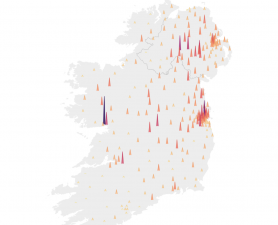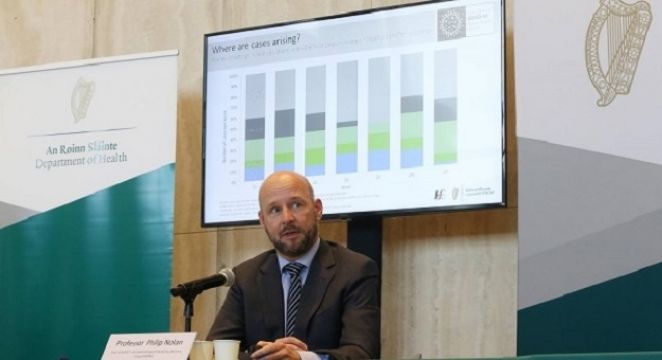The National Public Health Emergency Team (Nphet) are cautiously optimistic as recent case numbers may indicate Covid-19 vaccines are having a positive impact, with "signs of protection among healthcare workers" already being noted.
Good signs were also reported in long-term residential healthcare settings, with the chair of Nphet’s epidemiological modelling advisory group, Professor Philip Nolan, saying there is "early but clear evidence" showing the vaccination programme is having the desired impact on case numbers in these settings.
There were 613 new cases of the virus reported on Thursday, with 35 additional deaths.
Speaking at Nphet's press briefing on Thursday, Prof Nolan said there has been a "sudden and sharp decrease" in the number of cases recorded in long-term residential care facilities, while the number of Covid-related deaths in such settings was also decreasing at a much quicker pace compared to the wider community.
Earlier concerns that the suppression of the virus had plateaued seemed somewhat eased as Prof Nolan noted a "renewed decrease in test positivity".
The demand for tests has also fallen and the impact on daily case numbers caused by the resumption of asymptomatic close contact testing has now levelled off.
Close contacts
Earlier, HSE chief executive Paul Reid expressed concern regarding higher levels of movement being seen across society, including people going to work and between households.
In the Nphet briefing, Prof Nolan confirmed the average number of close contacts per confirmed adult case has increased slightly in the past week, from 2.1 to 2.6, but added "most people maintain very low levels of close contacts", attributing the rise to a very small number of people reporting a large number of contacts.
Prof Nolan also said falling levels of the virus were being seen across all age groups, with the 19-24 cohort proving the only exception. However, he noted the increase in case numbers among young adults was largely attributed to known outbreaks, not mobility and community transmission, which was the case towards the end of last year.
Nphet now estimate the reproductive, or R number, to be in the region of 0.65-0.85. Prof Nolan said the increase in the R number, estimated to be between 0.4-0.7 in late January, was due to the UK variant of the virus becoming dominant here.
The UK variant, which is more transmissible than the original form of the virus, now accounts for approximately 90 per cent of cases in the State according to Prof Nolan, while it had made up roughly 55 per cent of cases in January.
Hope

The deputy chief medical officer, Dr Ronan Glynn was slow to suggest when the country might achieve herd immunity as there is debate as to what the term specifically means.
Dr Glynn said he hopes a significant portion of eligible adults will be vaccinated by September, but it is too soon to say when life may return to normal due to significant variables, such as new variants of the virus and the impact they may have on vaccine efficacy.
"We want to give people hope, but we have a responsibility not to give people false hope," Dr Glynn said.
The deputy CMO added work is ongoing regarding the possibility of easing visitor restrictions for nursing homes, with a decision expected to be made by March 11th.







